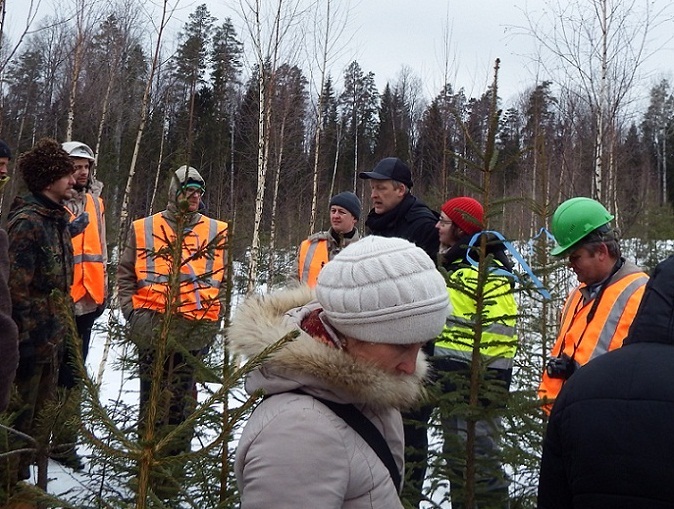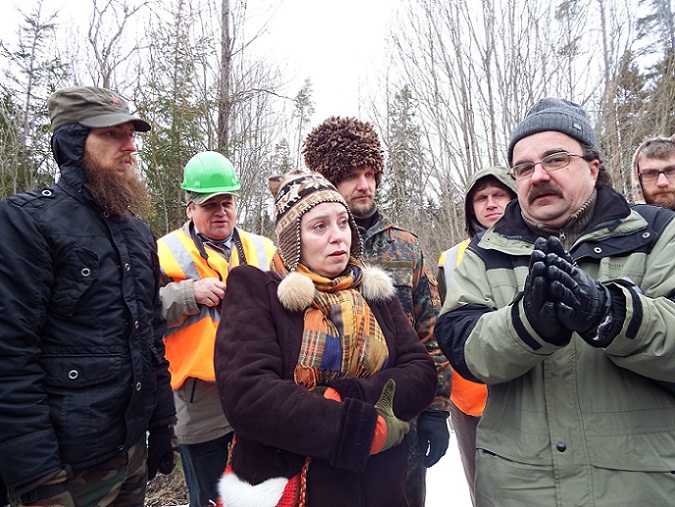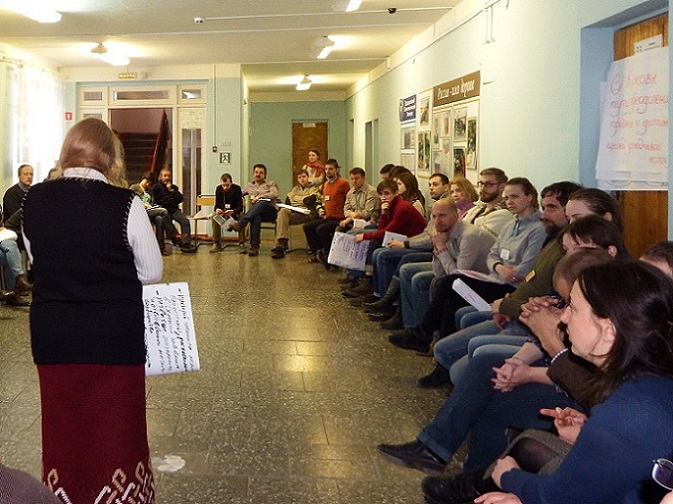The Forest of the Future – a Question of Today
The Silver Taiga Foundation has taken part in the international forum «Forests for the Future” held in the Podporozhsky district of the Leningrad region. The forum was devoted to sustainable forest management, forest regeneration, preservation and development of the traditional multipurpose forest use.
The forum organizers – Russian Ecovillages and Eco-initiative Network, Center of Independent Sociological Research (St. Petersburg), Regional network for sustainable village development (Arkhangelsk region), and Permaculture Association (Sweden) – aimed at discussion of such issues as introduction of sustainable forest management models into practical application, multipurpose forest use priority, performance of large-scale efficient forest regeneration works, and involvement of the local communities in the forest management.
The Forum brought together representatives of all stakeholders – participants of forest relations: forest business – Russian and foreign, local population of forest territories, non-governmental organizations from different regions of Russia, as well as Russian national, foreign, and international environmental NGOs.
The entire range of problems declared by the forum initiators was reflected in the reports presented at the very first plenary meeting. Konstantin Kobyakov, WWF Russia High Conservation Value Forest project coordinator, devoted his speech to the current state of the intact forest landscapes in Russia. He draw attention to the dynamics of the ongoing developments, and, above all, the losses of the past 10 – 13 years (according to WWF data, 21 million ha of intact areas have been lost during these years). Olga Ilyina, representing Northern Environmental Coalition (SPOK), talked about the present-day practice and prospects for conservation of the forest environment during the forest use by the example of Karelia. Andrey Lyubimtsev, a representative of the Forest Alternative company from Tikhvin of the Leningrad region, has tried to cover the intensive forest use philosophy in his speech.
Judging by the questions raised by the participants, the presentation of Silver Taiga Foundation representative Valentina Semyаshkinа has also aroused interest of the audience. It was devoted to the practice of identifying the forests important for the livelihood of the local population currently implemented in some districts of Komi in the framework of Silver Taiga projects (identifying of the sites of mass picking of mushrooms and berries with the proposal to establish a special forest use mode on these areas; mapping of hunting lands and other places of traditional nature use; procedures for coordination of the forest plots use between leaseholders and local community, etc.) .
It should be noted that the peculiarity of this forum was that the local population of the forest territories was represented mainly by the residents of ecovillages, but not indigenous traditional villages we are used to. However, some of the ecovillages have been created and now are developing on the basis of the former or existing villages (for example, Grishino ecovillage in the Podporozhsky district). The rest are recently formed new settlements. For example, Kovcheg ecovillage in the Maloyaroslavets district of the Kaluga region currently populated by about one hundred people, including forty children, was founded more than a decade ago almost “in the middle of nowhere”.
Anyhow, same as indigenous villagers, residents of ecovillages cannot avoid some relationships and often even conflicts with the loggers working nearby. So, the problem related to the lack of the “social forests” category in our legislation is as relevant for them as for the forest villages in Komi. Communication with the ecovillages residents was interesting in other respects too. For example, from the point of view of relationships within their community. United by the common purpose and world view, they are more willing to cooperate within their community, more initiative and proactive, which helps them to achieve much in protection of their interests. That was demonstrated by the presentations of Dmitry Zubkon from Kovcheg ecovillage – on the experience in conservation of the forest around the village, Margarita Davydova (Divny Mir (Wonderful World) creative workshop, Vologda region) – on the experience in the establishment of the household attractive for tourists, ecotourism development, and opportunities for economic use of the former agricultural lands covered with young forest.
The first day concluded with a Brain Storm on the topic “How to achieve sustainable forest use in Russia”. The discussion participants tried to answer the following questions: What are the ideal sustainable forest use practices? What are the main obstacles that prevent achieving this goal? What are the ways to surmount the challenges and achieve the proper sustainable forest use?
The second day of the forum was no less eventful: a trip to the forest and acquaintance with the first experience of introduction the intensive forest use elements by Metsya Forest Podporozhye company, presentation of examples of foreign experience in felling changes and sustainable forestry in the statements of Mikael Karlsson (Silvаskоg, Sweden) and Hannes Schmitt (Lübeck, Germany), presentation of new publications, including the Guidelines for social forests allocation in the framework of FSC certification, developed by WWF Russia. On the same day, a brief work in groups based on the Open Space Methodology was organized. There everyone was free to propose discussion issues he considered important, gathering the forum participants interested in the suggested topic around him.
The session devoted to the local residents’ involvement in the forest management process has also turned out to be interesting and diverse. Here the experience of Grishino ecovillage (a forest restoration project implemented jointly with “Metsya Forest Podporozhye”), Ustyansky district of the Arkhangelsk region (Ustyansky Nature Park establishment initiative) and some others has been shared.
The Forestry Forum participants have adopted an outcome document, containing an agreed position on the discussed issues. Besides, the document included the issues on which an agreement has not been reached so far.

The Forum participants are getting acquainted with “Metsya Forest Podporozhye” experience of forest use

Pavel Bezverkhov (“Forest Alternative”, Tikhvin, the Leningrad region) is speaking about intensive forestry details
Photo by Irina Shamanova



